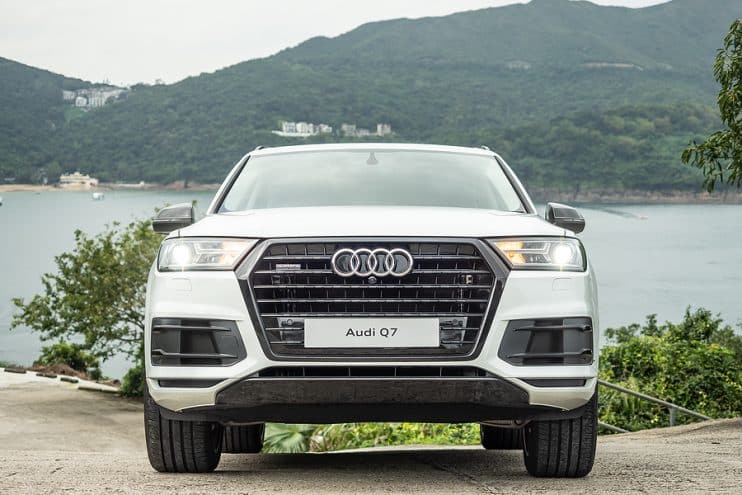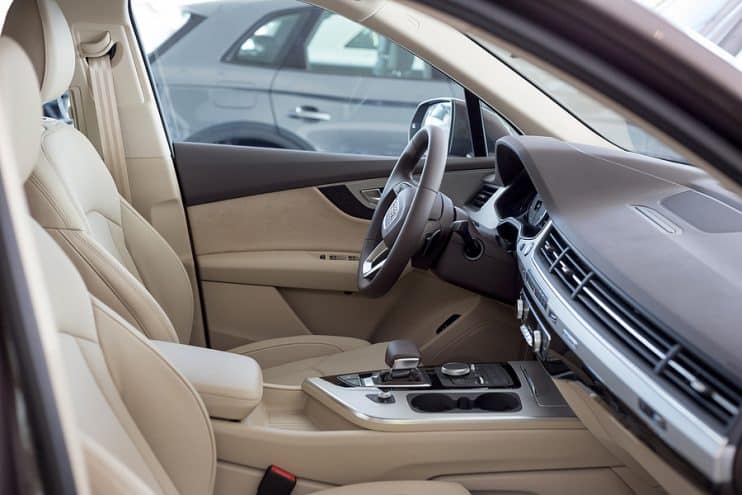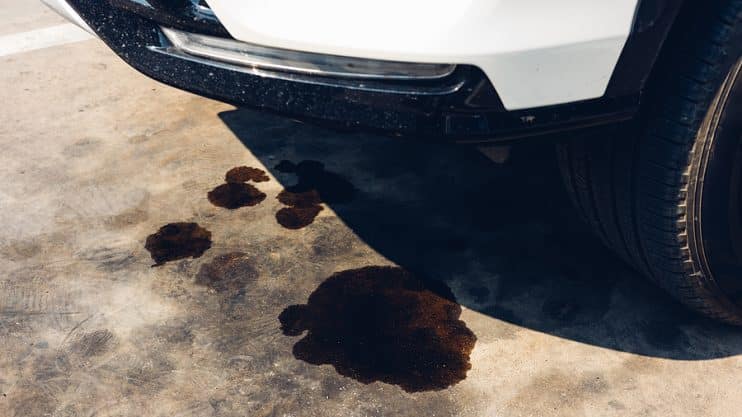
The Audi Q7 is a luxury midsize SUV in production since 2005. It was the first SUV vehicle from German automaker Audi, a subsidiary of the Volkswagen Group.
The original Q7 (2005-2015) shared its platform with the Volkswagen Touareg and Porsche Cayenne and offered a choice of V6 or V8 engines. The second generation Q7 (2015 – present) moved to Volkswagen’s MLB platform. It’s lighter and more fuel-efficient than the original, with a focus on technology and connectivity features.
The seven-seater Audi Q7 is known for its advanced technology and spacious interior, making it a popular choice. Engine options for the current Q7 include a 2.0L turbo 4-cylinder, 3.0L turbo V6, and a hybrid model.
Table of contents:
- What are the most common faults with the Audi Q7?
- Is the Audi Q7 a reliable car?
- What’s the best year?
- Is the Audi Q7 expensive to repair?
What are the most common faults with the Audi Q7?
The Audi Q7 has its fair share of recurrent issues to be aware of. These include the following:
Misfiring
Engine misfires can occur for various reasons, such as faulty ignition coils, spark plugs, or fuel injectors, but the issue appears more frequently in the 2007 to 2011 Audi Q7s.
Drivers have reported misfiring or their vehicle shuddering during idling or acceleration. Some report their check engine light illuminating after starting the vehicle cold.
It’s possible to fix the issue by replacing the spark plugs or coils, but it’s essential to get your vehicle checked out if it’s misfiring, as sometimes it can be caused by a more serious issue, such as problems with the pistons or cylinders.
Knock sensor
Several Audi Q7 owners have encountered a situation where their check engine light comes on, indicating a problem with the knock sensor.
Malfunctioning knock sensors can often lead to reduced acceleration and potential engine damage. This issue has been reported by owners of Q7 models ranging from 2007 to 2012.

Front headrests
Some Audi Q7 drivers have reported uncomfortable front headrests that tilt too far forward, causing back pain or neckache while driving.
Although the Audi Q7 front headrest can be tilted further back, some drivers say the range of movement is insufficient for comfortable driving. Audi forums report drivers removing the front headrest for a more comfortable drive.
Rear axle
Audi has recalled more than 31,000 vehicles, including the 2021 Q7 model, because of a problem with the rear axles alignment, causing uneven wear on the rear tire.
As part of the repair procedure, dealerships were supposed to inspect the alignment of the rear axle. However, the repair instructions provided by Audi should have included this crucial step. As a result, the rear axle may remain misaligned, causing premature wear on the rear tires. Drivers might also notice symptoms such as a misaligned steering wheel or the car pulling to one side when braking or accelerating.
Leaking sunroof causing electrical problems
Several vehicle owners have reported sunroof leaks causing electrical problems with radio speakers and other electrical equipment, such as indicators and lights.
This issue is more common in the 2007 Audi Q7 model. Given the risks of electronics and water, addressing this problem is crucial for ensuring safety.
Suspension/shocks
A few of the most common issues with Audi Q7 air suspension systems are the suspension warning light coming on, loss of ride height and noisy sounds from the suspension system.
While it’s possible to drive an Audi Q7 with a faulty air suspension, it’s not recommended. Driving with a defective system can lead to safety issues and more damage to the vehicle.
Airbag problems
Some drivers have reported issues with the Audi Q7 airbags, including the airbag light turning on for no reason.
A faulty sensor is one of the most common reasons for the airbag light to turn on in the Audi Q7. Loose or corroded connections, a faulty clockspring, and a defective airbag control module are other potential causes.
Since an illuminated airbag light can cause your vehicle to fail its MOT, it’s worth getting it checked out at your local Audi dealer and fixing it as soon as possible.

Oil leaks from the timing chain cover area
The Audi 3.0L supercharged V6 engine has earned a reputation for oil leaks, specifically from the upper timing covers.
The upper timing covers play a critical role in protecting the timing chain. Over time, the gasket material used in these covers can become hardened and brittle, allowing engine oil to seep out. It’s usually necessary to replace the gaskets, which can be a costly and time-consuming job.
Popping noises
Some drivers have reported hearing unusual popping or creaking noises. A worn purge valve on the intake manifold causes this noise as the system tests itself and finds the fault.
Audi Q7 vehicles with the problem include models from 2007 to 2012. While you can drive a car with a faulty purge valve, it will increase engine emissions and cause further damage to critical engine parts, so it’s worth getting it replaced as soon as possible,
Seat belt problems
Several Audo Q7 drivers have reported problems with the Q7 seatbelts, including fraying belts, rear seatbelts that become unlocked from the locked position, and seatbelts that stay locked.
In 2021, Audi recalled thousands of Q7s for a seatbelt locking retractor malfunction.
Is the Audi Q7 a reliable car?
Overall, Audi vehicles are known for their build quality and advanced engineering. However, like any car, they can experience issues over time and may require new or used Audi Q7 parts.
According to the most recent reliability data from What Car?, the Audi Q7 has established itself as a reliable choice among used cars. It achieved an impressive rating of 96.6% and secured the second position in the luxury SUV category.
What’s the best year?
The 2015+ models have improved over the first generation. Many reviewers recommend the 2017 Q7 thanks to its enhanced mid-size luxury crossover SUV design and improved engine performance. Others say the 2014 Audi Q7 is the best vehicle option if you enjoy a luxurious interior design.
Is the Audi Q7 expensive to repair?
The Audi Q7 can be expensive to repair and maintain. Parts and labour rates can be costly, while the complex technology usually requires dealership diagnosis. Recurring issues like air suspension problems or oil leaks often run over £2000 in parts and labour.
The Q7’s large engines and status mean higher ongoing costs for fuel, road tax, company car tax, and insurance premiums. Owners report average yearly maintenance between £600-£1000. However, finding a trusted independent mechanic can provide some savings.






.png)